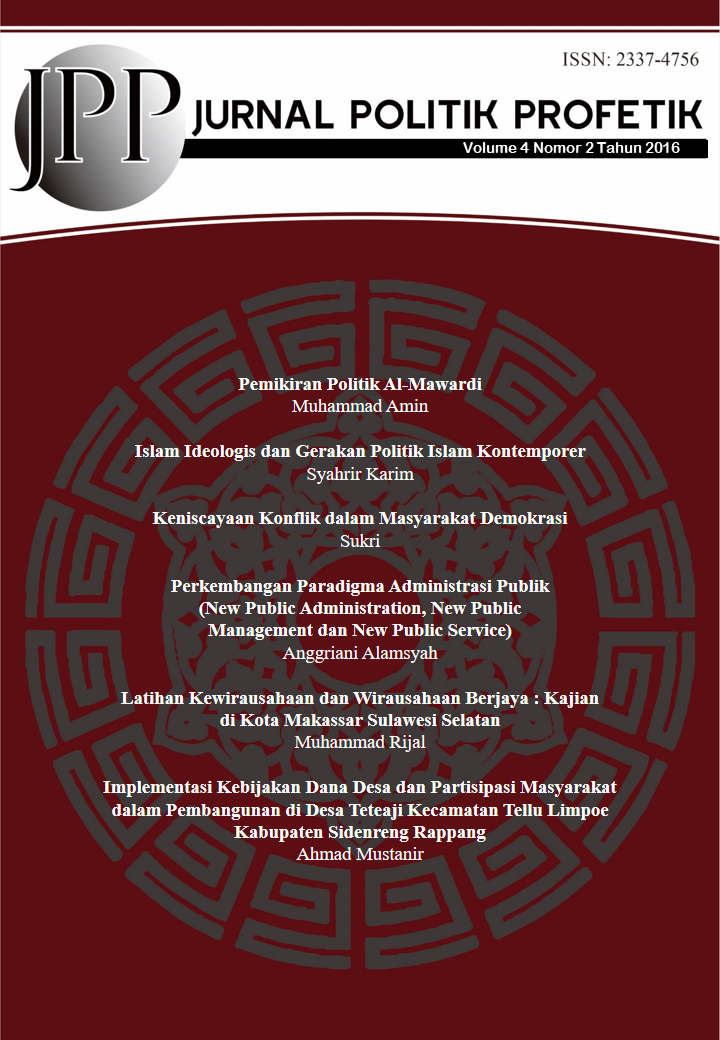KENISCAYAAN KONFLIK DALAM MASYARAKAT DEMOKRASI
Abstract
Nowadays there is a tendency that seeing conflict in the era of democracy as a negative excesses of the existence of democracy. The assumption that democracy is a good system and will bring good for human life then interpreted by a society without conflict. The understanding seems to mask the fact that freedom and equality of each individual offered by the democratic system basically means providing space for conflict because of the nature of human beings as creatures who always has a difference. This paper aims to discuss how conflicts tend to be regarded as non-democratic phenomenon as something that is actually reasonable in the context of democracy. Through the election as one of the pillars and the main indicators of democracy that seems to be a criticism of the denial of the conflict as an important element in democratic society.Downloads
References
Agustino, Leo,Pilkada dan Dinamika Politik Lokal. Pustaka Pelajar Yogyakarta, 2009
Aspinall, Edward and Marcus Mietzner.Problems of democratization in Indonesia; election, Institutions and Society, Instutute of Southeast Asian Studies (ISEAS), 2010
Beetham, David et.al, Assessing the Quality of Democracy A Practical Guide.International Institute for Democracy and Electoral Assistance, 2008
Dalton, Russell J. et.al.,Understanding democracy: data from Unlikely Places,Journal of Democracy, Vol. 18, number 4, 2007
Davidson, Jamie and David Henley, (ed.),The Revival of Tradition in Indonesian Politics: The Deployment of Adat from Colonialism to Indigenism. New York: Routledge, 2007
Feld, Lars P. and Gebhard Kirchg¨assner, Direct democracy, political culture, and the outcome of economic policy: a report on the Swiss experience, European Journal of Political Economy, Vol. 16, 2000
Guy S. Goodwin-Gill,Free and Fair Elections New Expanded Edition. Inter-Parliamentary Union Geneva, 2006
Hardin, Russell,Do we want trust in Government. In Democracy & Trust.Edited by M. E. Warren. New York: Cambridge University Press, 1999
Honig, Bonnie,Between Decision and Deliberation: Political Paradox in Democratic Theory, Journal of Legal Philosophy. 2, 2008
Huber, Evelyne, et.al,The Paradoxes of Contemproray of Democracy. Formal.Participatory, and Social Dimensions, Comparative Politics, Vol. 29. No. 3. April, 2005
Huntington, P. Samuel,Democracy’s Third Wave.Journal of Democracy,Vol.2. No.2 Spring, 1991
Kammerud, Lisa,An Integrated Approach to Elections and Conflict. IFES White Paper. International Foundation for Electoral Systems, 2012
Lindberg, Staffan I., The Power of Elections Democratic Participation, Competition, and Legitimacy in Africa. Lund Political Studies 134. Department of Political Science Lund University, Sweden, 2004
Lukin, Alexander, Electoral Democracy or Electoral Clanism? Russian Democratization and Theories of Transition: Demokratizatsiya, No. 1 Winter, 1999
Mouffe, Chantal, Democratic Politics and Agonistic Pluralism, disampaikan pada Seminarion Interdisciplinar os Sentidos das Culturas Coordinado Por Ramon Maiz.Consello da Cultura Galega. Venres, paper, 2009
Nordholt, Henk Schulte and Gerry van Klinken,Politik Lokal di Indonesia, Yayasan Pustaka Obor Indonesia dan KITLV Jakarta, 2007
Ober, Josiah, The original meaning of “democracy”: Capacity to do things, not majority rule, paper,Un-published, 2007
Omisore, Bernard Oladosu and Ashimi Rashidat Abiodun,Organizational Conflicts: Causes, Effects and Remedies.International Journal of Academic Research in Economics and Management Sciences, November, Vol. 3, No. 6, 2014
Tyson, Adam D. Decentralization and Adat Revivalism in Indonesia; The Politics of Becoming Indigeneous. Routledge New York, 2010
United Nations Development Programs, Elections and Conflict Prevention; A Guide to Analysis, Planning and Programming. Democratic Governance Group Bureau for Development Policy, 2009















